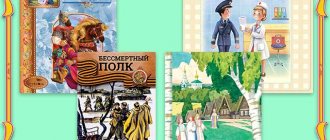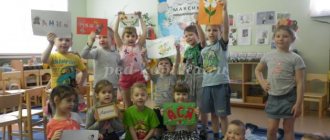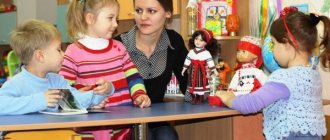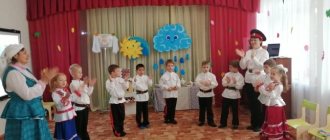Patriotic education of preschool children in kindergarten
Consultations for preschool teachers.
How to raise a little patriot? Question: “What is patriotism? S.I. Ozhegov defined patriotism as “devotion and love for one’s Fatherland, one’s people.” G. Baklanov wrote that this is “not valor, not a profession, but a natural human feeling.” Education of patriotic feelings (from the history of pedagogy) V G. Belinsky, K.D. Ushinsky, N.A. Dobrolyubov and others believed that education in a child becoming a citizen of his homeland is inseparable from instilling in him humane feelings: kindness, justice, the ability to resist lies and cruelty. The teachers argued: “Those high patriotic feelings that characterize a developed adult and which are capable of inspiring him to great deeds and noble deeds are not given to a child ready-made from birth. They arise and develop throughout childhood under the influence of social conditions of life and upbringing.” In a broad sense, patriotism is interpreted as the personification of love for modern life, its achievements and problems. By patriotic education we mean the interaction of an adult and children in joint activities and communication, which is aimed at revealing and forming in the child universal moral qualities of the individual, familiarizing him with the origins of culture, the nature of his native land, and nurturing an emotionally effective attitude. In a broad sense, patriotism is interpreted as the personification of love for modern life, its achievements and problems. The essence of patriotic education is to sow and cultivate in a child’s soul the seeds of love for the native nature, for the native home and family, for the history and culture of the country, created by the labors of relatives and friends, those who are called compatriots. The content of patriotic education is to educate a child from the first years of life to have a humane attitude towards the world around him, love for his relatives and family, home, region, city, town, homeland, respect for people of different nationalities, state symbols (the anthem, flag, coat of arms of the Russian Federation) . Development of humane feelings in the process of patriotic education: the formation of ethical ideas, skills of cultural behavior, social and public qualities, respect for adults, a responsible attitude to carrying out assignments, the ability to play and work together, the ability to fairly evaluate one’s actions and the actions of other children. Appeal to the paternal heritage fosters: Respect for the land on which the child lives, pride in it. (children need to know the way of life, everyday life, rituals, beliefs, the history of their ancestors, their culture). Knowledge of the history of your people, native culture (will help in the future to treat the history and culture of other peoples with great attention, respect and interest). The feeling of patriotism is multifaceted in content: it is love for one’s native places, and pride in one’s people, and a feeling of one’s inseparability with the entire surrounding world, and the desire to preserve and increase the wealth of one’s homeland. Objectives of patriotic education: nurturing in a child love and affection for his family, relatives home, kindergarten, native street, city; formation of a caring attitude towards native nature and all living things; instilling respect for people's work; developing interest in folk traditions and crafts; formation of basic knowledge about human rights; expanding ideas about Russia, its capital; introducing children to the symbols of the state: coat of arms, flag, anthem; developing a sense of responsibility and pride for the achievements of the Motherland; the formation of tolerance, a sense of respect and sympathy for other people, nations, and their traditions. The tasks of patriotic education are solved in all types of children's activities: In direct educational activities, in productive activities, in play activities, in work activities, in everyday life, etc., since they raise a patriot in a child all his life: in kindergarten and at home, his relationships with adults and peers. Conditions for effective work on instilling patriotism in preschool children: an integrated approach; the teacher’s knowledge of the history and culture of his people; correctly selected material (based on the principle of accessibility and understandability); thematic structure of the material; the preparedness of teachers and parents to solve the problems of educating children's patriotism, close cooperation between kindergarten teachers and family members, in establishing trusting business contacts with the families of pupils, involving family members in the pedagogical process, creating a substantive development environment in the kindergarten and family. Means of patriotic education: oral folk art; decorative and applied arts; music; fiction; a game; independent children's activities. Features of patriotic education: A preschooler, first of all, must recognize himself as a member of the family, then a citizen of Russia, and only then an inhabitant of planet earth. You need to go from near to far. Forms of organizing work with children: conversations, didactic games, travel games, excursions, conversation games, dramatization games, entertainment, etc. V. A. Sukhomlinsky “The beauty of the native land, revealed through fairy tales, fantasy, creativity, is a source of love to the Motherland. Understanding and feeling the greatness and power of the Motherland comes to a person gradually and has its sources in beauty." The most important thing is to remember that a responsible approach to business, a mother’s attitude towards a child, a benevolent acceptance of his independence, and not the establishment of petty guardianship over him - all this is folk pedagogy (also a component of patriotic education), and even under normal conditions it will help to implement the program, the content of which must first be mastered by the adults themselves.b/
We recommend watching:
Raising patriotism in preschool children Synopsis of joint educational activities in the preparatory group Knowledge of the surrounding world in kindergarten Moral and patriotic education of children in kindergarten
Similar articles:
Summary of a lesson in the preparatory group on the topic: “The Baptism of Rus'”
Conversation about courage with older preschoolers
Conversation about hard work in the preparatory group
Conversation with children 5-8 years old. Russian anthem
About the Russian flag for children 5-7 years old
CONSULTATION FOR PARENTS Patriotic education of children of senior preschool age
CONSULTATION FOR PARENTS
Patriotic education of children of senior preschool age
Fostering love for one's homeland and respect for one's people begins in early childhood. And it begins not with the abstract “we love our country,” but with knowledge, with the attitude that is formed in children everywhere - in the family, on the street, at national holidays, events - and in kindergarten, under the guidance of a teacher. The teacher has many means to form a patriotic culture in children.
Patriotism
- a moral principle, a social feeling, the content of which is love for the fatherland and the willingness to subordinate one’s private interests to its interests. Patriotism presupposes pride in the achievements and culture of one’s homeland, the desire to preserve its character and cultural characteristics and identification with other members of the nation, the willingness to subordinate one’s interests to the interests of the country, the desire to protect the interests of the homeland and one’s people. The historical source of patriotism is the existence of separate states established for centuries and millennia, which formed an attachment to their native land, language, and traditions. In the conditions of the formation of nations and the formation of national states, patriotism becomes an integral part of public consciousness, reflecting national moments in its development.
Patriotism, as a moral quality, is the result of purposeful education, and preschool childhood is a favorable period for introducing a child to the national culture. Therefore, it is very important to begin raising a true patriot of one’s homeland precisely at this age, when the child begins to intensively develop socially. This period, in its psychological characteristics, is the most favorable for the formation of patriotism, since preschool children are characterized by high sensitivity, easy learning, unlimited trust in adults, the desire to imitate them, emotional responsiveness and interest in everything around them.
Patriotic education of children is one of the main tasks of a preschool institution. The feeling of patriotism is multifaceted in content. This includes love for one’s native places, pride in one’s people, a sense of inseparability with the outside world, and a desire to preserve and increase the wealth of one’s country. Therefore, our task, as teachers, is to: cultivate in a child love and affection for his family, home, kindergarten, street, city; formation of a caring attitude towards nature and all living things; instilling respect for work; developing interest in Russian traditions and crafts; formation of basic knowledge about human rights; expanding ideas about cities (depending on where the child lives); introducing children to the symbols of the state: coat of arms, flag, anthem and understanding their meaning and symbolism; developing a sense of responsibility and pride for the country’s achievements; the formation of tolerance, a sense of respect for other peoples and their traditions. These problems are solved in all types of children's activities: in classes, in games, in work, in everyday life. Patriotic education of a child is a complex pedagogical process. It is based on the development of moral feelings.
A child’s sense of homeland begins with his relationship to his family, to the closest people - mother, father, grandmother, grandfather. These are the roots that connect him with his home and immediate environment. The feeling of the Motherland begins with admiration for what the child sees in front of him, what he is amazed at and what evokes a response in his soul. And although many impressions have not yet been deeply realized by him, when passed through childhood perception, they play a huge role in the formation of the personality of a patriot. Each nation has its own fairy tales, and they all pass on from generation to generation the basic moral values: kindness, friendship, mutual assistance, hard work. An older preschooler should know the name of his city, his street, the streets adjacent to it, and also in honor of whom they are named. They explain to him that every person has a home and a city where he was born and lives. This requires excursions around the city, into nature, observation of the work of adults, where each child begins to realize that work unites people, requires them to be coherent, mutual assistance, and knowledge of their business. And here, acquaintance of children with the folk crafts of the region and folk craftsmen becomes of great importance.
In kindergarten, it is especially important to support and direct the child’s interest in people of other nationalities; tell where the people of a particular nationality live geographically, about the uniqueness of nature and climatic conditions on which life, clothing, the nature of work, and cultural features depend. By the end of preschool age, the child should know: our country is inhabited by people of different nationalities; every nation has its own language, customs and traditions, art and architecture; Every nation is talented and rich in craftsmen, dancers, musicians, and artists.
The purpose of patriotic education
is the formation of the foundations of patriotism as a moral quality of the individual, the development in the individual of high social activity, civic responsibility, spirituality, the formation of a personality with positive values and qualities, capable of demonstrating them in the creative process in the interests of the Fatherland; education of a convinced patriot who loves his Motherland, devoted to the Fatherland, ready to serve it with his labor and protect its interests.
The period of preschool age, in terms of its psychological characteristics, is the most favorable for the education of patriotism, since a preschooler is distinguished by trust in an adult, he is characterized by imitation, suggestibility, emotional responsiveness, and sincerity of feelings. Knowledge and impressions experienced in childhood remain with a person for life.
Patriotism
is one of the moral qualities of a person, which is formed already in preschool age, and, like any moral quality, it includes:
1·content component - children’s mastery of a range of ideas and concepts about the world around them that is accessible to their age: the social structure of society, the life of the people, the history of the country, culture, traditions of the people, the nature of their native land, the development of correct views on the facts of the social life of the country;
2·emotional-motivating - the individual experiences a positive emotional attitude towards the acquired knowledge, the world around him, love for his hometown (village), region, country, pride in the labor and military successes of the people, respect for the historical past of his native country, admiration for folk art, love to the native language, the nature of the native land, showing interest in this information, the need to expand one’s horizons, the desire to participate in socially useful work;
3·active component - the implementation of emotionally felt and conscious knowledge in activities (providing assistance to adults, showing care for them, readiness to complete an adult’s task, caring attitude towards nature, things, public property, the ability to reflect acquired knowledge in creative activity), the presence of a complex of moral -volitional qualities, the development of which ensures an effective attitude towards the environment.
The correct organization of work on the patriotic education of older preschoolers is based, first of all, on knowledge of the age-related capabilities and psychological characteristics of children of this age. In older preschool age, as psychologists note, new formations appear, indicating the possibility and necessity of special work on the patriotic education of children. These include, first of all, the formation of moral feelings in preschoolers based on the enrichment of content, growth of awareness, depth and stability of emotional experiences.
A preschool child is highly emotional. Feelings dominate all aspects of his life, determine actions, act as motives for behavior, and express the child’s attitude towards the environment.
A distinctive feature of the feelings of children of senior preschool age is the expansion of the range of phenomena that cause these feelings. Deep familiarity of children of this age with the phenomena of social life contributes to the growth of the social principle in feelings, the formation of the correct attitude to the facts of life around them.
Of great importance in the process of developing love for the Motherland in preschoolers is the fact that the emotional experiences of children of senior preschool age acquire a deeper and more stable character. Children of this age are able to show concern for loved ones and peers.
Objectives of patriotic education
preschoolers are:
1. Formation in children of a system of knowledge about their homeland, which can be presented as follows: natural history and geographical information (geographical features of their native land, climate, nature of the country), information about the life of their people (features of life, work, culture, traditions), social information (knowledge about the sights of your hometown, capital, country, knowledge of the name of the country, its capital, other cities, state symbols), some historical information (about the life of the people in different historical periods, about the exploits of people during the Great Patriotic War, knowledge of historical city monuments, streets).
2. Cultivating in preschoolers an interest in the world around them and emotional responsiveness to events in public life. It involves the activation of the emotional sphere of the individual, the cultivation of such feelings as love for family and friends, hometown, respect for the history of the people, admiration for works of folk art, love for nature, hatred for enemies.
3. Involving children in practical activities to apply the acquired knowledge. It involves the development of certain skills and abilities in children: the ability to reflect accumulated knowledge in play, artistic and labor activities, the ability to take part in socially oriented work, the ability to take care of nature and the results of the work of others, the ability to reflect knowledge in speech, communication with adults and peers .
Consultation for parents - “Patriotic education of children of senior preschool age in the family”
Civic-patriotic education today is one of the most important links in the system of educational work. The answer to the question “What is patriotism?” At different times, many famous people of our country tried to give. So, S.I. Ozhegov defined patriotism as “... devotion and love for one’s Fatherland and one’s people.”
G. Baklanov wrote that this is “...not valor, not a profession, but a natural human feeling.” Recently, the term “new patriotism” has appeared, which includes a sense of responsibility to society, a feeling of deep spiritual attachment to family, home, Motherland, native nature, and a tolerant attitude towards other people.
The foundations of patriotism begin to be laid, first of all, in the child’s immediate environment, or rather in the family.
From childhood, boys need to develop ideas about the need to always take the side of the weak, not to offend them, and to provide help. A boy must understand that he is a man, that real men take on the most difficult and difficult work, and for this they must prepare for this from childhood, harden themselves, and play sports.
Parents should develop in their children a positive experience of “conflict resolution” (be able to negotiate, give in, come to an agreement without “fists”, etc.
What a child of senior preschool age should know and be able to do:
—
knows and states their first and last name, the first and patronymic names of their parents, where they work, how important their work is for society;
- knows family holidays; has regular responsibilities at home;
- can talk about his hometown (town, village), name the street where he lives;
- knows that the Russian Federation (Russia) is a huge multinational country; that Moscow is the capital of our Motherland. Has an idea of the flag, coat of arms, melody of the anthem;
- has ideas about the Russian army, about the years of war, about Victory Day.
Recommendations for parents.
1. The upbringing of a little patriot begins with what is closest to him - his home, the street where he lives, kindergarten.
2. Draw the child’s attention to the beauty of his hometown.
3. While walking, tell us what is on your street, talk about the meaning of each object.
4.Give an idea of the work of public institutions: post office, store, library, etc. Observe the work of the employees of these institutions, note the value of their work.
5.Together with your child, take part in the work of improving and landscaping your yard.
6. Expand your own horizons.
7. Teach your child to correctly evaluate his actions and the actions of other people.
8.Read him books about your homeland, its heroes, traditions, and culture of your people.
9. Encourage your child for his desire to maintain order and exemplary behavior in public places.
10. If you want to raise your child as a worthy person and citizen, do not speak ill of the country in which you live.
11.Tell your child about the trials that befell your ancestors, from which they emerged with honor.
12. Introduce your child to the memorable and historical places of your homeland.
13. Even if you don’t want to go with your child to a museum or exhibition on a weekend, remember that the sooner and more regularly you do this while your child is still small, the more likely it is that he will visit cultural institutions as a teenager. age and youth.
14.Remember that the more you express dissatisfaction with every day you live, the more pessimism and dissatisfaction with life your child will express.
15.When you communicate with your child, discuss not only problems, but also note the positive aspects.
16. Support your child’s desire to show himself on the positive side, never say to him such words and expressions: “Keep your head down!”, “Sit quietly!”, “It’s none of your business!”
17. Watch with him programs and films that tell about people who glorified our country in which you live, positively evaluate their contribution to the life of society.
18. Do not cultivate indifference in your child, it will turn against you.
19. As early as possible, discover in your child the ability to show positive emotions, they will become your hope and support in old age!






